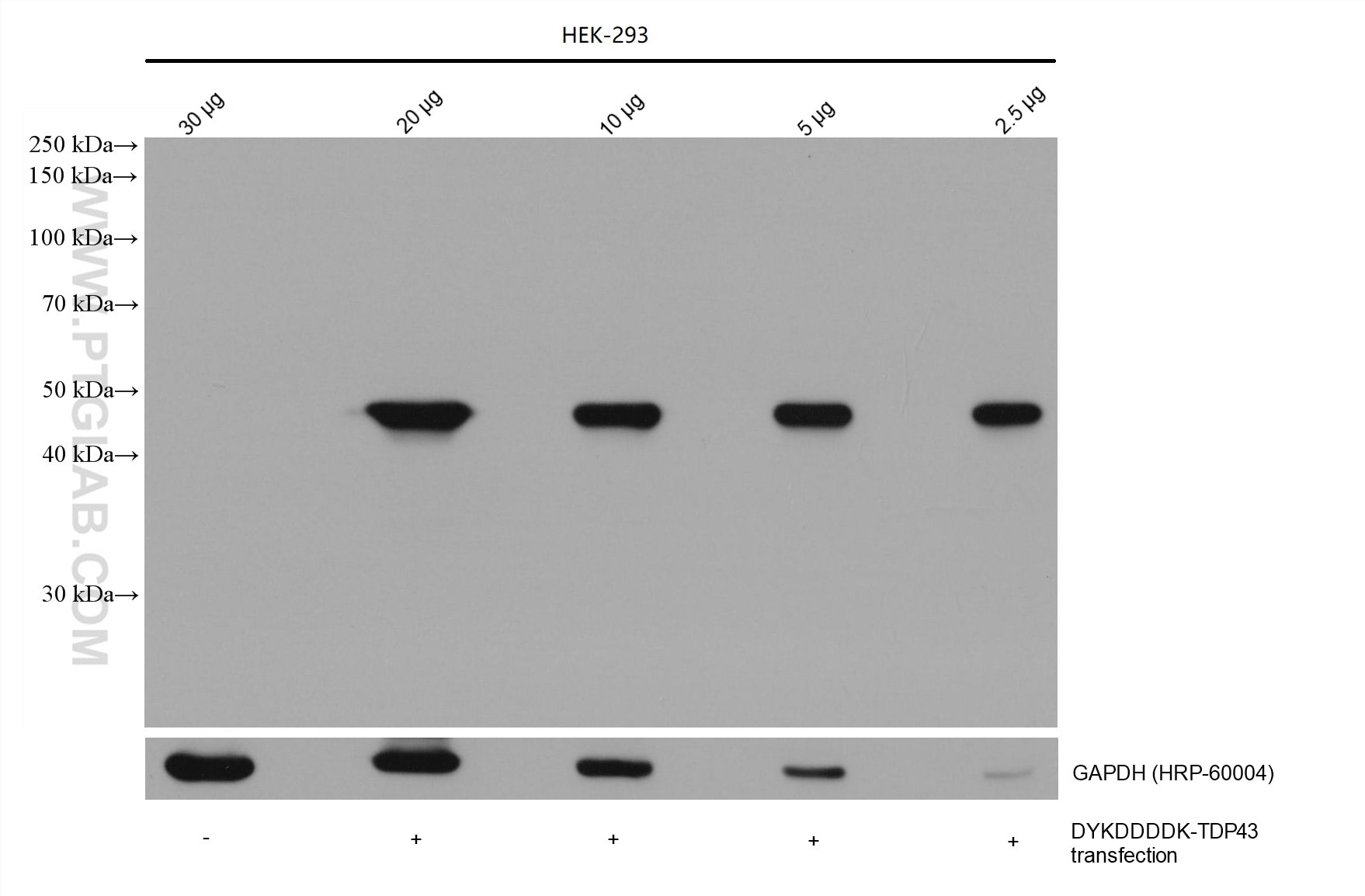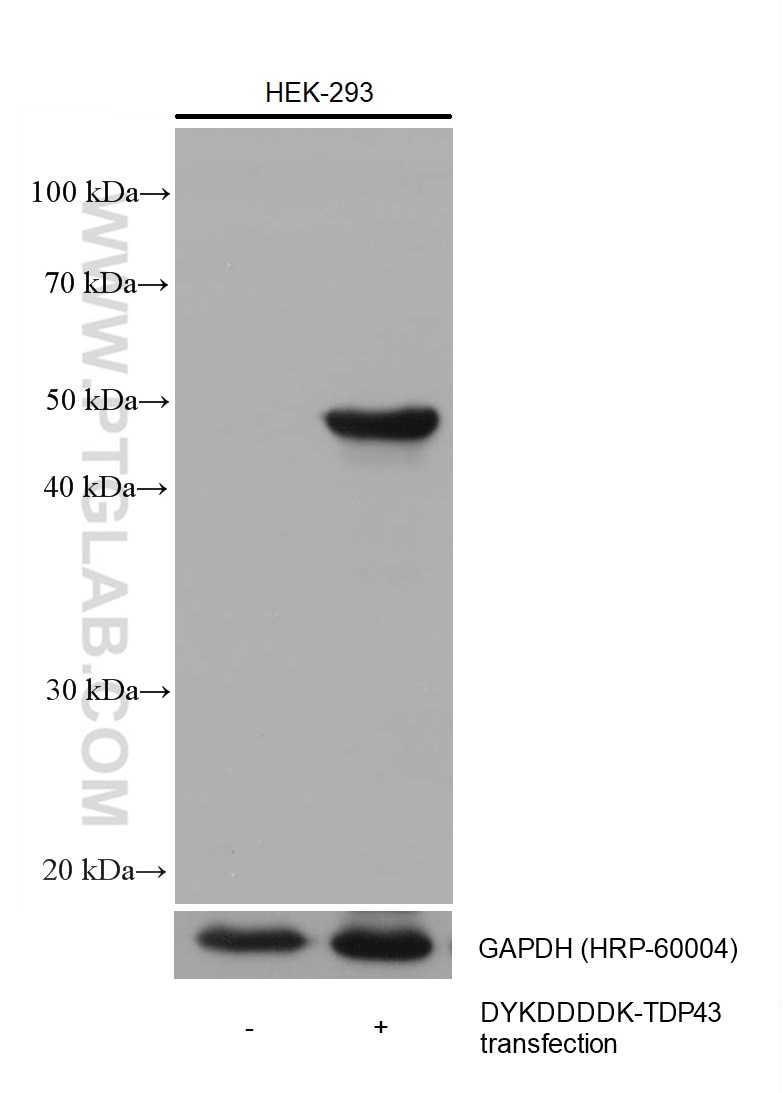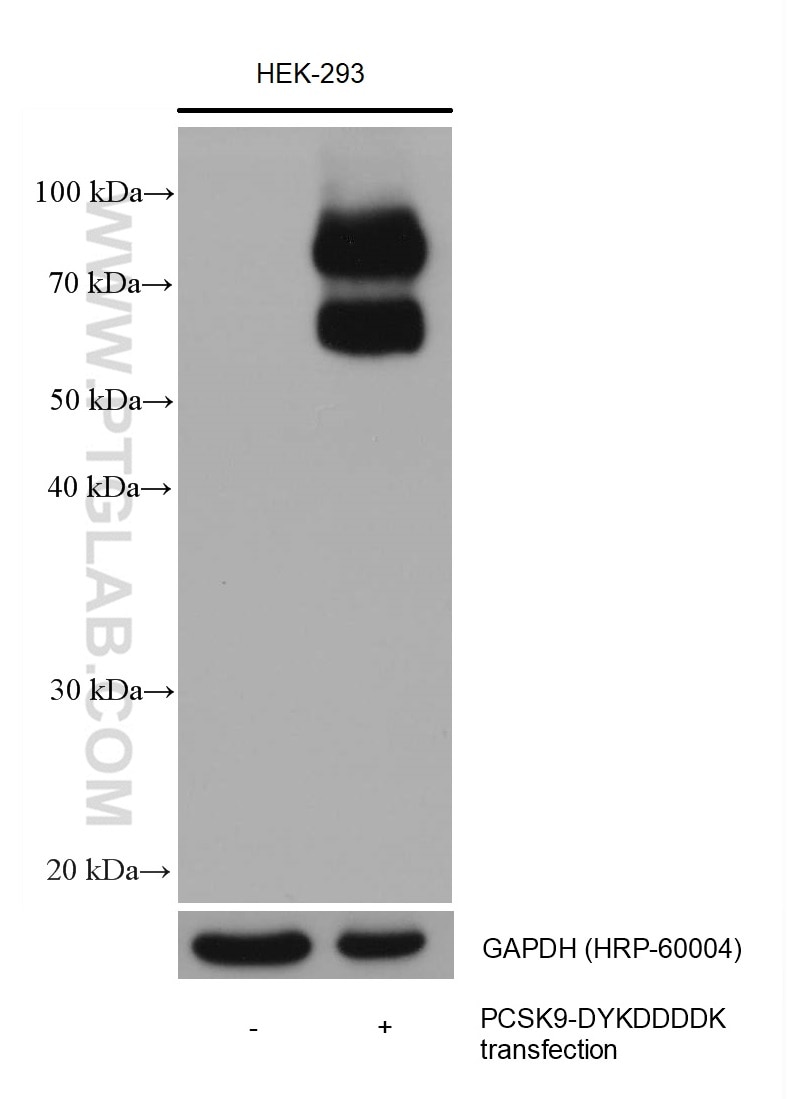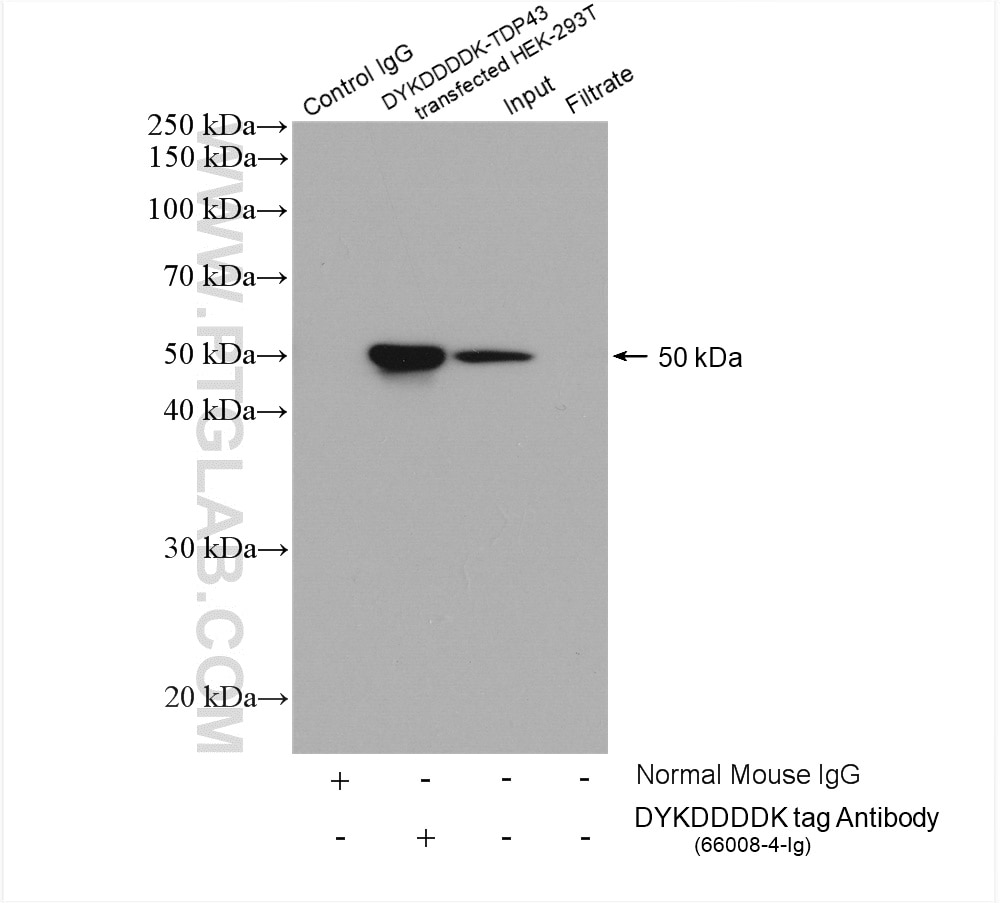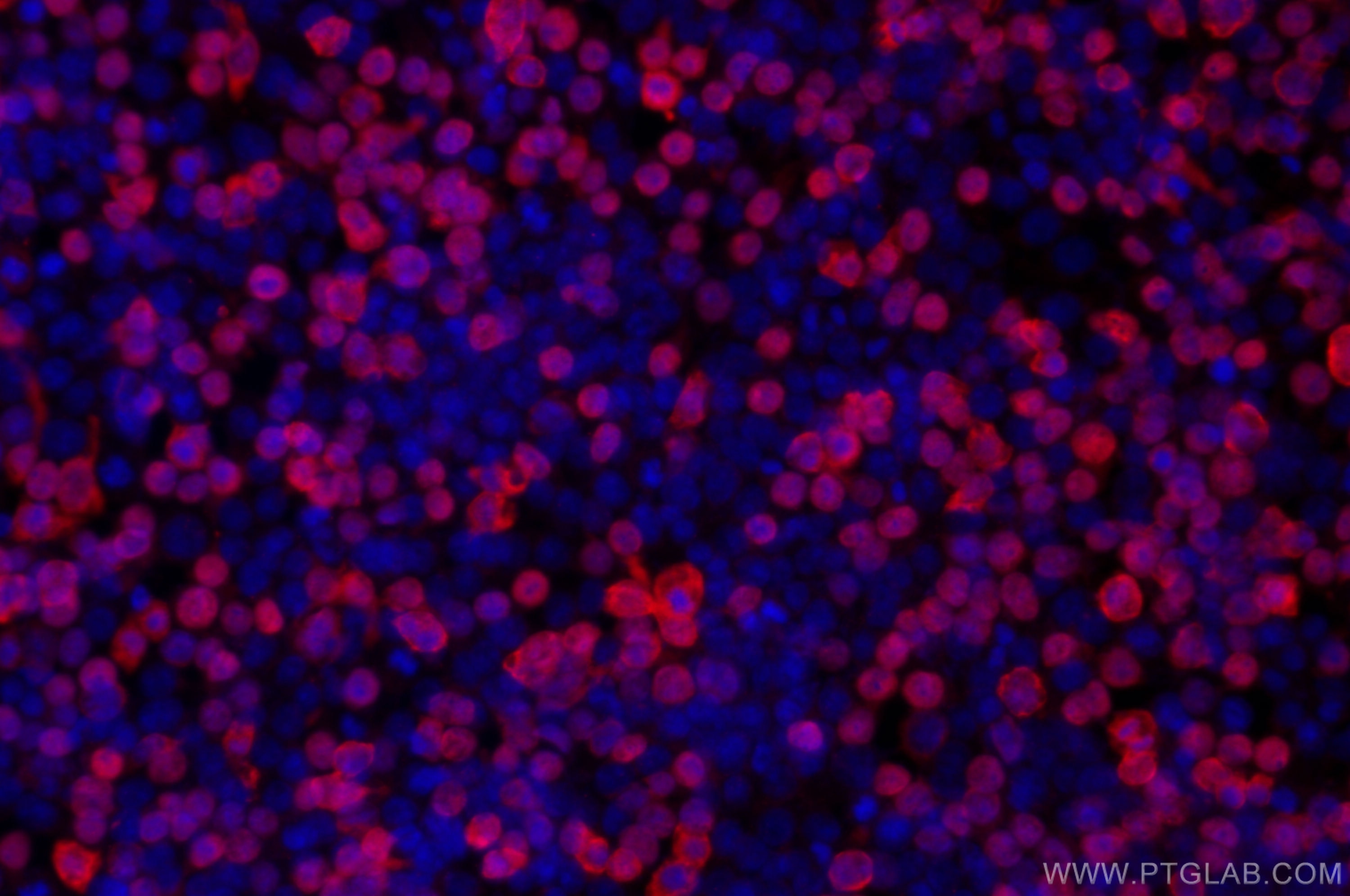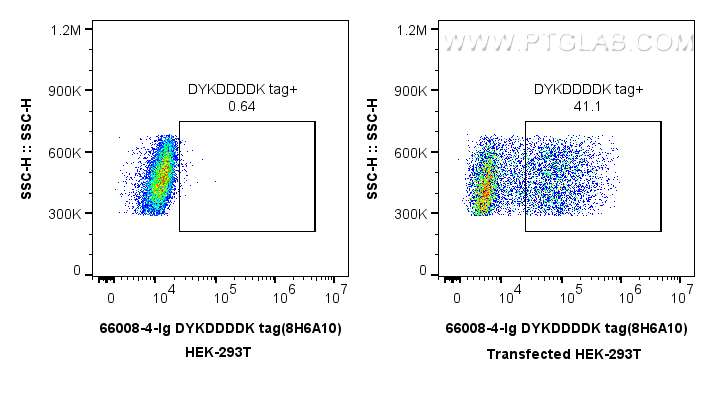Validation Data Gallery
Tested Applications
| Positive WB detected in | Transfected HEK-293 cells |
| Positive IP detected in | Transfected HEK-293 cells |
| Positive IF/ICC detected in | Transfected HEK-293 cells |
| Positive FC (Intra) detected in | Transfected HEK-293 cells |
Recommended dilution
| Application | Dilution |
|---|---|
| Western Blot (WB) | WB : 1:5000-1:50000 |
| Immunoprecipitation (IP) | IP : 0.5-4.0 ug for 1.0-3.0 mg of total protein lysate |
| Immunofluorescence (IF)/ICC | IF/ICC : 1:200-1:800 |
| Flow Cytometry (FC) (INTRA) | FC (INTRA) : 0.25 ug per 10^6 cells in a 100 µl suspension |
| It is recommended that this reagent should be titrated in each testing system to obtain optimal results. | |
| Sample-dependent, Check data in validation data gallery. | |
Product Information
66008-4-Ig targets DYKDDDDK tag in WB, IHC, IF/ICC, FC (Intra), IP, CoIP, ChIP, RIP, ELISA applications and shows reactivity with recombinant protein samples.
| Tested Reactivity | recombinant protein |
| Cited Reactivity | human, mouse, rat, monkey, chicken |
| Host / Isotype | Mouse / IgG2b |
| Class | Monoclonal |
| Type | Antibody |
| Immunogen |
Peptide 相同性解析による交差性が予測される生物種 |
| Full Name | DYKDDDDK tag |
| Gene Symbol | |
| Gene ID (NCBI) | |
| RRID | AB_2918475 |
| Conjugate | Unconjugated |
| Form | |
| Form | Liquid |
| Purification Method | Protein A purification |
| UNIPROT ID | FLAGTAG |
| Storage Buffer | PBS with 0.02% sodium azide and 50% glycerol{{ptg:BufferTemp}}7.3 |
| Storage Conditions | Store at -20°C. Stable for one year after shipment. Aliquoting is unnecessary for -20oC storage. |
Background Information
DYKDDDDK Tag ( Equivalent To FLAG Antibody From Sigma ) with the following sequence DYKDDDDK, is a hydrophilic tag for recombinant protein technology. Tags can be used as a tool to localize gene products in a variety of cell types, study proteins topology, and also help to identify and characterize new, low abundance or poorly immunogenic proteins. Due to its high hydrophilic character, the DKYDDDDK tag is likely to be located on the surface of a fusion protein, which enables the tag to be accessible for antibodies. DYKDDDDK Tag Antibody is generated against 1xDYKDDDDK tag (DYKDDDDK) and can recognize protein containing one or more DYKDDDDK tags, independently on N-terminal, C-terminal or internal regions of the target protein. Anti-FLAG is a registered trademark of Sigma-Aldrich Biotechnology.
Protocols
| Product Specific Protocols | |
|---|---|
| FC protocol for DYKDDDDK tag antibody 66008-4-Ig | Download protocol |
| IF protocol for DYKDDDDK tag antibody 66008-4-Ig | Download protocol |
| IP protocol for DYKDDDDK tag antibody 66008-4-Ig | Download protocol |
| WB protocol for DYKDDDDK tag antibody 66008-4-Ig | Download protocol |
| Standard Protocols | |
|---|---|
| Click here to view our Standard Protocols |
Publications
| Species | Application | Title |
|---|---|---|
Cell Metab Nicotinamide metabolism face-off between macrophages and fibroblasts manipulates the microenvironment in gastric cancer | ||
Nat Metab Maternal exercise prevents metabolic disorders in offspring mice through SERPINA3C | ||
Blood Functional, structural and molecular characterizations of leukemogenic driver MEF2D-HNRNPUL1 fusion. | ||
Nat Commun The stomatin-like protein StlP organizes membrane microdomains to govern polar growth in filamentous actinobacteria under hyperosmotic stress | ||
Nat Commun UV-B irradiation-activated E3 ligase GmILPA1 modulates gibberellin catabolism to increase plant height in soybean | ||
Nat Commun Homodimer-mediated phosphorylation of C/EBPα-p42 S16 modulates acute myeloid leukaemia differentiation through liquid-liquid phase separation |

